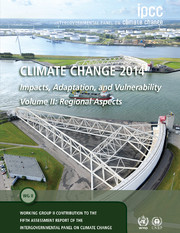 Climate Change 2014 – Impacts, Adaptation and Vulnerability: Part B: Regional Aspects
Climate Change 2014 – Impacts, Adaptation and Vulnerability: Part B: Regional Aspects Chapter 29 - Small Islands
from Chapters 21-30
Published online by Cambridge University Press: 05 January 2015
Summary
29.1. Introduction
It has long been recognized that greenhouse gas (GHG) emissions from small islands are negligible in relation to global emissions, but that the threats of climate change and sea level rise (SLR) to small islands are very real. Indeed, it has been suggested that the very existence of some atoll nations is threatened by rising sea levels associated with global warming. Although such scenarios are not applicable to all small Island nations, there is no doubt that on the whole the impacts of climate change on small islands will have serious negative effects especially on socioeconomic conditions and biophysical resources—although impacts may be reduced through effective adaptation measures.
The small islands considered in this chapter are principally sovereign states and territories located within the tropics of the southern and western Pacific Ocean, central and western Indian Ocean, the Caribbean Sea, and the eastern Atlantic off the coast of West Africa, as well as in the more temperate Mediterranean Sea.
Although these small islands nations are by no means homogenyeous politically, socially, or culturally, or in terms of physical size and character or economic development, there has been a tendency to generalize about the potential impacts on small islands and their adaptive capacity. In this chapter we attempt to strike a balance between identifying the differences between small islands and at the same time recognizing that small islands tend to share a number of common characteristics that have distinguished them as a particular group in international affairs. Also in this chapter we reiterate some of the frequently voiced and key concerns relating to climate change impacts, vulnerability, and adaptation while emphasizing a number of additional themes that have emerged in the literature on small islands since the IPCC Fourth Assessment Report (AR4). These include the relationship among climate change policy, activities, and development issues; externally generated transboundary impacts; and the implications of risk in relation to adaptation and the adaptive capacity of small island nations.
- Type
- Chapter
- Information
- Climate Change 2014 – Impacts, Adaptation and Vulnerability: Part B: Regional AspectsWorking Group II Contribution to the IPCC Fifth Assessment Report, pp. 1613 - 1654Publisher: Cambridge University PressPrint publication year: 2014
- 5
- Cited by


